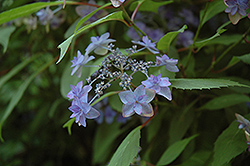Height: 4 feet
Spread: 4 feet
Sunlight:
![]()
![]()
Hardiness Zone: 6b
Other Names: Mountain Hydrangea, syn. Purple Tiers Hydrangea
Description:
A beautiful compact shrub that features showy lacecaps producing lavender to blue double flowers from purple-red buds; serrated leaves are tinged burgundy in the fall; a wonderful choice for the flower garden or border
Ornamental Features
Miyama Yae Murasaki Hydrangea features bold double lavender lacecap flowers with blue overtones at the ends of the branches from early summer to early fall. The flowers are excellent for cutting. It has green deciduous foliage. The serrated pointy leaves turn an outstanding burgundy in the fall.
Landscape Attributes
Miyama Yae Murasaki Hydrangea is a multi-stemmed deciduous shrub with an upright spreading habit of growth. Its relatively coarse texture can be used to stand it apart from other landscape plants with finer foliage.
This is a relatively low maintenance shrub, and should only be pruned after flowering to avoid removing any of the current season's flowers. It has no significant negative characteristics.
Miyama Yae Murasaki Hydrangea is recommended for the following landscape applications;
- Accent
- Mass Planting
- General Garden Use
Planting & Growing
Miyama Yae Murasaki Hydrangea will grow to be about 4 feet tall at maturity, with a spread of 4 feet. It has a low canopy. It grows at a medium rate, and under ideal conditions can be expected to live for approximately 30 years.
This shrub does best in full sun to partial shade. You may want to keep it away from hot, dry locations that receive direct afternoon sun or which get reflected sunlight, such as against the south side of a white wall. It prefers to grow in average to moist conditions, and shouldn't be allowed to dry out. It is not particular as to soil type, but has a definite preference for acidic soils. It is somewhat tolerant of urban pollution, and will benefit from being planted in a relatively sheltered location. Consider applying a thick mulch around the root zone in winter to protect it in exposed locations or colder microclimates. This is a selected variety of a species not originally from North America.
Disclaimer - This resource is provided for informational purposes only and does NOT reflect current availability. Inventory varies seasonally, so we cannot guarantee that every plant will be in stock at all times - please contact your favourite GardenWorks location directly for current availability. It does not include our entire inventory of plants, so be sure to visit GardenWorks to see varieties that may not be represented on this list.

